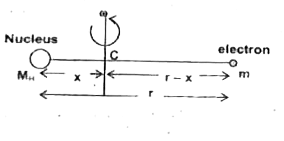When two marbles collide, their total momentum before collision is equal to
the difference in their momentum after collision.
the average of their momentum after collision.
the square of the sum of their momentum after collision.
their total momentum after collision.
The correct Answer is:D
To solve the question "When two marbles collide, their total momentum before collision is equal to...", we can follow these steps:
Step 1: Understand the concept of momentum
Momentum (p) is defined as the product of an object's mass (m) and its velocity (v). Mathematically, it is expressed as:
p=m×v
Step 2: Define total momentum before the collision
When two marbles collide, we need to consider the momentum of both marbles before the collision. If we denote the mass and velocity of the first marble as m1 and v1, and for the second marble as m2 and v2, the total momentum before the collision (denoted as Pi) can be expressed as:
Pi=m1×v1+m2×v2
Step 3: Apply the law of conservation of momentum
According to the law of conservation of momentum, the total momentum of a closed system before an event (like a collision) is equal to the total momentum after the event. This means:
Pi=Pf
where Pf is the total momentum after the collision.
Step 4: Conclusion
Thus, the total momentum before the collision is equal to the total momentum after the collision. Therefore, the answer to the question is that the total momentum before the collision is equal to the total momentum after the collision.
Final Answer
The total momentum before the collision is equal to the total momentum after the collision.
---
Momentum (p) is defined as the product of an object's mass (m) and its velocity (v). Mathematically, it is expressed as:
p=m×v
When two marbles collide, we need to consider the momentum of both marbles before the collision. If we denote the mass and velocity of the first marble as m1 and v1, and for the second marble as m2 and v2, the total momentum before the collision (denoted as Pi) can be expressed as:
Pi=m1×v1+m2×v2
According to the law of conservation of momentum, the total momentum of a closed system before an event (like a collision) is equal to the total momentum after the event. This means:
Pi=Pf
where Pf is the total momentum after the collision.
Thus, the total momentum before the collision is equal to the total momentum after the collision. Therefore, the answer to the question is that the total momentum before the collision is equal to the total momentum after the collision.
The total momentum before the collision is equal to the total momentum after the collision.
Topper's Solved these Questions
- DYNAMICSBOOK - PEARSON IIT JEE FOUNDATIONCHAPTER - DYNAMICSEXERCISE - CONCEPT APPLICATION(LEVEL 2)
19 Videos
- DYNAMICSBOOK - PEARSON IIT JEE FOUNDATIONCHAPTER - DYNAMICSEXERCISE - CONCEPT APPLICATION(LEVEL 3)
15 Videos
- DYNAMICSBOOK - PEARSON IIT JEE FOUNDATIONCHAPTER - DYNAMICSEXERCISE - CONCEPT APPLICATION(LEVEL 1) (Fill in the blanks)
6 Videos
- CHEMICAL EFFECTS OF ELECTRIC CURRENTBOOK - PEARSON IIT JEE FOUNDATIONCHAPTER - CHEMICAL EFFECTS OF ELECTRIC CURRENTEXERCISE - COMPETITION CORNER (MCQ)
48 Videos
- ELECTRICITYBOOK - PEARSON IIT JEE FOUNDATIONCHAPTER - ELECTRICITYEXERCISE - CONCEPT APPLICATION (Level 3)
10 Videos
Similar Questions
Two balls A and B. are of the sme size but the mass of A is double that of B. they move along the sme line in opposite direction. A with velocity 2μ and B with velocity 3μ If their total kinetoc energy after collision is half their total kinetic energy before collision find the coefficient of restitution. Find also their velocities after collision.
View SolutionA particle of mass m, collides with another stationary particle of mass M. If the particle m stops just after collision, then the coefficient of restitution for collision is equal to
View Solution
Knowledge Check
In the above problem the total KE before collision is
A4500JB7500JC3000JD0JWhen two free radicals collide
Atermination of the free radical reaction resultsBthey explode with the release of a large quantity of energyCionization resultsDnone of the above is possibleWhen two bodies collide elastic, then:
AKE of the system along is conservedBonly momentum is conservedCboth KE and momentum are conservedDneither KE nor momentum is conserved
When two bodies collide elastically, then
View SolutionWhen two bodies collide elastically, then
View SolutionIn one-dimensional elastic collision, the relative velocity of approach before collision is equal to
View SolutionStatement-1 : In an elastic collision in one dimension between two bodies, total momentum remains the same before, during and after the collision.
Statement-2 : In an elastic collision in one dimension between two bodies, total kinetic energy remains the same before, during and after the collision.
View Solution
The angular momentum of the atom will be constant about an axis passing through
View Solution
